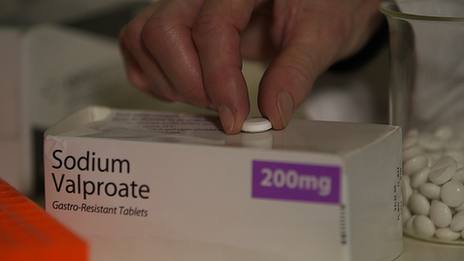Advice call after epilepsy drug Epilim study
- Published

Doctors have been aware of the risk associated with the anticonvulsant drug sodium valproate, known as Epilim, for decades
Campaigners want the Welsh government to review the way the possible side effects of an anti-epilepsy drug are relayed to pregnant mothers.
It comes after a recent study revealed a link between the drug and developmental problems in children.
The Welsh government said it was not its remit and a UK government agency said it followed national guidelines.
Meanwhile, Newport West MP Paul Flynn told The Wales Report on BBC Wales that the mothers' plight was "dreadful".
Doctors have been aware of the risk associated with the anticonvulsant drug sodium valproate, known as Epilim, for decades.
But a recent study by the University of Liverpool also revealed a link between the drug and other developmental problems in children.
The drug has been around since the mid-seventies and can cause heart problems and a range of physical deformities, such as spina bifida and cleft lip in unborn babies.
The latest research by the university suggests unborn babies exposed to the drug could also be born with mental disorders, a low IQ and autism.
Campaigner Nicole Crosby-McKenna, from Epilepsy Action, wants the Welsh government to review the way information is conveyed to pregnant patients in Wales.
She said: "We would like to know, if they haven't got access to an epilepsy specialist nurse, who is giving the women that information? Are the GPs passing the information on to women? And also, do the GPs have enough specialist knowledge to accurately give them pre-conception counselling?"
Newport West MP Paul Flynn said: "The plight of these mothers is a dreadful one because they tend to blame themselves but whatever it is, it's nothing to do with the mother.
"They took the advice of the doctors and the failure was the medical system and the drug companies that failed to live up to their responsibility."
Dr Khalid Hamandi, from the Welsh Epilepsy Unit at the University Hospital of Wales in Cardiff, said: "We feel that services are under-provided for.
"We need more neurologists, more specialists with an interest in epilepsy, and we need more awareness and involvement in epilepsy in primary care."
But the Welsh government said it was the responsibility of the UK's Medicines and Healthcare products Regulatory Agency (MHRA).
A government spokesman said: "Medicines licensing, ie ensuring quality, safety and efficacy is not devolved, it is the remit of MHRA."
A spokesman for the MHRA said it followed national guidelines.
He said: "Product information clearly states that Epilim should not be prescribed to women of child-bearing potential unless clearly necessary; in such cases effective contraception must be used during treatment. The product information for Epilim also contains clear advice about its safety of use during pregnancy, including information about the potential for risk of developmental delay, particularly of verbal IQ and the risk of autism spectrum disorders."
This is supported by research carried out by the University of Liverpool.
Professor Gus Baker, a neuropsychologist, followed 600 babies from birth to aged six and found a marked difference in the brain development of some of the children.
He said: "Our research has shown that if your child was exposed to sodium valproate then there's a significant increase in the risk of them developing Autism Spectrum Disorder - that's a nine-fold increase of a risk."
The drug's manufacturers, Sanofi, said valproate may be the only medication that effectively controls seizures for some women and to suddenly stop taking any anti-epileptic medication could lead to a recurrence of seizures.
A spokeswoman said: "Because of the well-known risk of birth defects, for a number of years valproate has not been recommended as a first-choice agent for women with epilepsy who are of child-bearing potential.
"As recommended by the manufacturer, women of childbearing potential should be informed of the risks and benefits of the use of valproate during pregnancy."
- Published25 February 2013
- Published20 February 2012
- Published20 January 2011